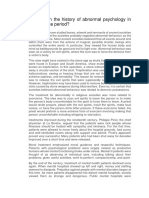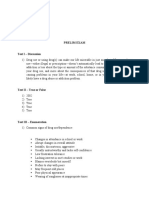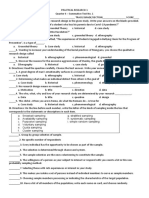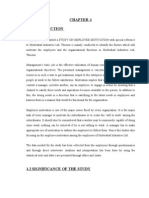0 ratings0% found this document useful (0 votes)
44 viewsCluster C Personality Disorders
Cluster C Personality Disorders
Uploaded by
Tiffany Luv AdriasAvoidant personality disorder is characterized by extreme social inhibition, feelings of inadequacy, and sensitivity to criticism. People with avoidant personality disorder avoid work, social, and school activities due to a fear of criticism or rejection. They have low self-esteem and often isolate themselves. Both genetics and environmental factors like childhood rejection are believed to play a role. Psychotherapy is the primary treatment, focusing on changing fearful and negative thought patterns and behaviors to help patients better cope with social situations. Medication may also be used to reduce anxiety.
Copyright:
© All Rights Reserved
Available Formats
Download as DOCX, PDF, TXT or read online from Scribd
Cluster C Personality Disorders
Cluster C Personality Disorders
Uploaded by
Tiffany Luv Adrias0 ratings0% found this document useful (0 votes)
44 views4 pagesAvoidant personality disorder is characterized by extreme social inhibition, feelings of inadequacy, and sensitivity to criticism. People with avoidant personality disorder avoid work, social, and school activities due to a fear of criticism or rejection. They have low self-esteem and often isolate themselves. Both genetics and environmental factors like childhood rejection are believed to play a role. Psychotherapy is the primary treatment, focusing on changing fearful and negative thought patterns and behaviors to help patients better cope with social situations. Medication may also be used to reduce anxiety.
Original Description:
File not mine. Credits to owner.
Original Title
CLUSTER-C-PERSONALITY-DISORDERS
Copyright
© © All Rights Reserved
Available Formats
DOCX, PDF, TXT or read online from Scribd
Share this document
Did you find this document useful?
Is this content inappropriate?
Avoidant personality disorder is characterized by extreme social inhibition, feelings of inadequacy, and sensitivity to criticism. People with avoidant personality disorder avoid work, social, and school activities due to a fear of criticism or rejection. They have low self-esteem and often isolate themselves. Both genetics and environmental factors like childhood rejection are believed to play a role. Psychotherapy is the primary treatment, focusing on changing fearful and negative thought patterns and behaviors to help patients better cope with social situations. Medication may also be used to reduce anxiety.
Copyright:
© All Rights Reserved
Available Formats
Download as DOCX, PDF, TXT or read online from Scribd
Download as docx, pdf, or txt
0 ratings0% found this document useful (0 votes)
44 views4 pagesCluster C Personality Disorders
Cluster C Personality Disorders
Uploaded by
Tiffany Luv AdriasAvoidant personality disorder is characterized by extreme social inhibition, feelings of inadequacy, and sensitivity to criticism. People with avoidant personality disorder avoid work, social, and school activities due to a fear of criticism or rejection. They have low self-esteem and often isolate themselves. Both genetics and environmental factors like childhood rejection are believed to play a role. Psychotherapy is the primary treatment, focusing on changing fearful and negative thought patterns and behaviors to help patients better cope with social situations. Medication may also be used to reduce anxiety.
Copyright:
© All Rights Reserved
Available Formats
Download as DOCX, PDF, TXT or read online from Scribd
Download as docx, pdf, or txt
You are on page 1of 4
CLUSTER C : PERSONALITY DISORDERS
Avoidant Personality Disorder
Description:
Avoidant personality disorder is characterized by feelings of extreme social
inhibition, inadequacy, and sensitivity to negative criticism and rejection. Yet
the symptoms involve more than simply being shy or socially awkward.
Avoidant personality disorder causes significant problems that affect the ability
to interact with others and maintain relationships in day-to-day life.
Avoidant Personality Disorder Symptoms
Avoidant personality disorder symptoms include a variety of behaviors, such
as:
Avoiding work, social, or school activities for fear of criticism or
rejection. It may feel as if you are frequently unwelcome in social
situations, even when that is not the case. This is because people with
avoidant personality disorder have a low threshold for criticism and
often imagines themselves to be inferior to others.
Low self-esteem
Self-isolation
When in social situations, a person with avoidant personality disorder may be
afraid to speak up for fear of saying the wrong thing, blushing, stammering, or
otherwise getting embarrassed. You may also spend a great deal of time
anxiously studying those around you for signs of approval or rejection.
A person who has an avoidant personality disorder is aware of being
uncomfortable in social situations and often feels socially inept. Despite this
self-awareness, comments by others about your shyness or nervousness in
social settings may feel like criticism or rejection. This is especially true if you
are teased, even in a good-natured way, about your avoidance of social
situations.
What causes avoidant personality disorder?
The exact cause of avoidant personality disorder is not known. However, it is
believed that both genetics and environment play a role. It is believed that
avoidant personality disorder may be passed down in families through genes
but this has not yet been proven. Environmental factors, particularly in
childhood, do play an important role. Shyness, often normal in young children,
lasts into adolescents and adulthood in those with avoidant personality
disorder. Those with the disorder often report past experiences of parental or
peer rejection, which can impact a person’s self-esteem and sense of worth.
Social Impact of Avoidant Personality Disorder
Avoidant personality disorder causes a fear of rejection that often makes it
difficult to connect with other people. You may be hesitant to seek out
friendships, unless you are certain that the other person will like you. When
you are involved in a relationship, you may be afraid to share personal
information or talk about your feelings. This can make it difficult to
maintain intimate relationships or close friendships.
According to the American Psychiatric Association’s Diagnostic and Statistical
Manual of Mental Disorders (DSM-5), a person diagnosed with avoidant
personality disorder needs to show at least four of the following criteria:
Avoids occupational activities that involve significant interpersonal contact, because
of fears of criticism, disapproval, or rejection.
Is unwilling to get involved with people unless they are certain of being liked.
Shows restraint within intimate relationships because of the fear of being shamed or
ridiculed.
Is preoccupied with being criticized or rejected in social situations.
Is inhibited in new interpersonal situations because of feelings of inadequacy.
Views self as socially inept, personally unappealing, or inferior to others.
Is unusually reluctant to take personal risks or to engage in any new activities
because they may prove embarrassing.
Avoidant behavior may commonly be seen in children or adolescents, but a
diagnosis of a personality disorder cannot be made in childhood because
shyness, fear of strangers, social awkwardness, or being sensitive to criticism
are often a normal part of child and adolescent development.
A mental health professional can assess your symptoms, make an accurate
diagnosis, and suggest the appropriate treatment options.
Avoidant Personality Disorder and Other Conditions
Other mental health disorders can occur along with avoidant personality
disorder. Treatments in these cases will be designed to help with the
symptoms of each disorder. A few of the conditions that most frequently occur
with avoidant personality disorder include:
Social phobia, in which a person experiences overwhelming anxiety and
self-consciousness in common social situations.
Dependent personality disorder, in which people rely excessively on
others for advice or to make decisions for them.
Borderline personality disorder, in which people have difficulties in many
areas including social relationships, behavior, mood, and self-image.
Many avoidant personality disorder symptoms are commonly shared among
these other conditions, particularly in the case of generalized social phobia.
Because of this, the disorders can be easily confused. It may take some time
for a mental health professional to make a clear diagnosis and choose the
appropriate treatments for you.
Management and Treatment
Treating personality disorders is difficult, because people with these disorders
have deep-rooted patterns of thinking and behavior that have existed for many
years. However, people with avoidant personality disorder tend to be good
candidates for treatment because their disorder causes them significant
distress, and most want to develop relationships. This desire can be a
motivating factor for people with avoidant personality disorder to follow their
treatment plans.
As with other personality disorders, psychotherapy is the main treatment for
avoidant personality disorder. Psychotherapy is a type of individual counseling
that focuses on changing a person’s thinking (cognitive therapy) and behavior
(behavioral therapy). Therapy is likely to focus on overcoming fears, changing
thought processes and behaviors, and helping the person better cope with
social situations. Medication—such as an antidepressant or anti-anxiety drug—
might be used to help manage the anxiety felt by people with this disorder. For
the best results, however, medication therapy should be done in combination
with psychotherapy. Treatment for people with this disorder is most effective
when family members are involved and supportive.
You might also like
- RejectedselfDocument9 pagesRejectedselfÂngela Ferreira100% (1)
- Davis, Jonathan - The Opposite of Addiction Is ConnectionDocument3 pagesDavis, Jonathan - The Opposite of Addiction Is ConnectionKen Eduardo Avila RouraNo ratings yet
- Autism Preparation Kit For Teachers PreviewDocument12 pagesAutism Preparation Kit For Teachers PreviewRoli Roli100% (2)
- Cross Cultural CommunicationDocument21 pagesCross Cultural Communicationchayanika9100% (3)
- Dr. Diane Poole Heller's Attachment Styles TestDocument4 pagesDr. Diane Poole Heller's Attachment Styles TestStancu Oana RuxandraNo ratings yet
- Neurosis According To Adler Z) - 3.7.15Document21 pagesNeurosis According To Adler Z) - 3.7.15Anca DobarleanuNo ratings yet
- Psych Final Exam Study GuideDocument15 pagesPsych Final Exam Study Guidecsuhajda97No ratings yet
- Write Down The History of Abnormal Psychology in Renaissance PeriodDocument12 pagesWrite Down The History of Abnormal Psychology in Renaissance PeriodKashish GautamNo ratings yet
- Hass Year 7 Unit Plan and Lesson SequenceDocument11 pagesHass Year 7 Unit Plan and Lesson Sequenceapi-474955325No ratings yet
- Coping With Panic Attacks and Agoraphobia: Did You Know..Document25 pagesCoping With Panic Attacks and Agoraphobia: Did You Know..savvy_as_98No ratings yet
- 4 Attachment StylesDocument1 page4 Attachment StylesDitha RimadiputriNo ratings yet
- Offensive Deffensive - Stress and DTDocument5 pagesOffensive Deffensive - Stress and DTCristina EneNo ratings yet
- Handling GriefDocument19 pagesHandling GriefjchingNo ratings yet
- Compassion FatigueDocument14 pagesCompassion FatigueGunjan SinghNo ratings yet
- CH 4 - Psychological DisordersDocument20 pagesCH 4 - Psychological DisordersMayookhaNo ratings yet
- Therapeutic Frame and Clinical BoundariesDocument9 pagesTherapeutic Frame and Clinical BoundariesPolitics Simplified updatesNo ratings yet
- Child Psychotherapy. Core ItemsDocument82 pagesChild Psychotherapy. Core ItemsScribdTranslationsNo ratings yet
- Neuropsychological Assessment in Autism Spectrum Disorder and Related ConditionsDocument9 pagesNeuropsychological Assessment in Autism Spectrum Disorder and Related Conditionsvirginia vianaNo ratings yet
- Nightmares and The BrainDocument3 pagesNightmares and The BrainGuru KiranNo ratings yet
- GC 601 - Carl Jung's Analytical PsychologyDocument3 pagesGC 601 - Carl Jung's Analytical PsychologyLeonard Patrick Faunillan BaynoNo ratings yet
- Yale Brown Obsessive Compulsive Scale Y BOCS July 2022 2Document9 pagesYale Brown Obsessive Compulsive Scale Y BOCS July 2022 2Yeniela ChirinosNo ratings yet
- Think CBT Conditions Specific FormulationsDocument45 pagesThink CBT Conditions Specific Formulationsumotlhophele100% (1)
- ReportDocument14 pagesReportTulika KumarNo ratings yet
- On Narrative Exposure Therapy PTSDDocument10 pagesOn Narrative Exposure Therapy PTSDtsavaliask6No ratings yet
- Highly Sensitive PersonDocument2 pagesHighly Sensitive PersonChatrina TandiloloNo ratings yet
- (BLOA) Evolutionary Theory of AttachmentDocument7 pages(BLOA) Evolutionary Theory of Attachmentstanley_leung_20100% (1)
- Aasp Technical ReportDocument5 pagesAasp Technical Reportbaji sharifNo ratings yet
- Needle Phobia (Yun Zhen) : Chris Shih, M.DDocument10 pagesNeedle Phobia (Yun Zhen) : Chris Shih, M.DChris ShihNo ratings yet
- Written Report On Mental Health PDFDocument7 pagesWritten Report On Mental Health PDFLovelene ChrizzeNo ratings yet
- Neurocognitive Assessments Transgender Adults - LTDocument14 pagesNeurocognitive Assessments Transgender Adults - LTDrNihilismNo ratings yet
- Emotion Regulation in Social Anxiety and Depression, A Systematic Review of Expressive Suppression and Cognitive Reappraisal, 2018 PDFDocument26 pagesEmotion Regulation in Social Anxiety and Depression, A Systematic Review of Expressive Suppression and Cognitive Reappraisal, 2018 PDFcj_catalinaNo ratings yet
- Scales For Psychosis ManyDocument47 pagesScales For Psychosis ManyDavid NaranjoNo ratings yet
- Play Therapy MenassaDocument15 pagesPlay Therapy MenassaNur Hidayah DaniNo ratings yet
- College Anxiety: How To Help An Anxious Student Transition SuccessfullyDocument5 pagesCollege Anxiety: How To Help An Anxious Student Transition SuccessfullybelbachirNo ratings yet
- Trauma and PhobiaDocument2 pagesTrauma and PhobiaGurvita SharmaNo ratings yet
- Trauma and Adverse Childhood Experiences (Aces) : The Impact of TraumaDocument2 pagesTrauma and Adverse Childhood Experiences (Aces) : The Impact of TraumaInfante SanndyNo ratings yet
- What Was Just Going Through My Mind?: Socratic QuestioningDocument1 pageWhat Was Just Going Through My Mind?: Socratic QuestioningEstéphany Rodrigues ZanonatoNo ratings yet
- Child Psychology Notes - OCR Psychology A-LevelDocument13 pagesChild Psychology Notes - OCR Psychology A-LevelsamNo ratings yet
- The Nine Types & Their Essential QualitiesDocument2 pagesThe Nine Types & Their Essential QualitiesSarabjeet KaurNo ratings yet
- CBT For DepressionDocument15 pagesCBT For DepressionSanaNo ratings yet
- Model HallucinationsDocument7 pagesModel HallucinationsDavid CrellinNo ratings yet
- Attachment StylesDocument2 pagesAttachment StylesCao Ngọc Quỳnh TrâmNo ratings yet
- Adlerian TherapyDocument12 pagesAdlerian TherapyKyle NonlesNo ratings yet
- What You Don't Expect When You're Expecting: Demonstrating Stigma Against Women With Postpartum Psychological DisordersDocument8 pagesWhat You Don't Expect When You're Expecting: Demonstrating Stigma Against Women With Postpartum Psychological DisordersAna Cristina Paiz ZepedaNo ratings yet
- Gender DysphoriaDocument7 pagesGender DysphoriaShilpaNo ratings yet
- Attachment and Parenting Styles Influences On Adult RelationshipsDocument6 pagesAttachment and Parenting Styles Influences On Adult RelationshipsMaya MayaNo ratings yet
- Anger 2018Document18 pagesAnger 2018Paulina Grosu100% (1)
- Where in Your Body Do You Feel ThatDocument2 pagesWhere in Your Body Do You Feel ThatAndrew Davidson DwyerNo ratings yet
- Personality TraitsDocument12 pagesPersonality TraitsjhumliNo ratings yet
- The Camouflaging Autistic Traits Questionnaire (CDocument3 pagesThe Camouflaging Autistic Traits Questionnaire (Clidicesilveira969No ratings yet
- SdsadaDocument9 pagesSdsadaAnonymous KrfJpXb4iNNo ratings yet
- FFX Sphere GuideDocument27 pagesFFX Sphere GuideDwi PramonoNo ratings yet
- WelcomeDocument38 pagesWelcomearshaNo ratings yet
- Emotionally Focused Therapy in ActionDocument74 pagesEmotionally Focused Therapy in ActionCarla TassinariNo ratings yet
- Appreciation Uniquely Predicts Life Satisfaction Above DemographicsDocument5 pagesAppreciation Uniquely Predicts Life Satisfaction Above DemographicsAmrina Husna SalimahNo ratings yet
- Borderline Personality DisorderDocument6 pagesBorderline Personality DisorderPersephona13No ratings yet
- The Science of Love and Attraction - Mehmet Oktar GulogluDocument247 pagesThe Science of Love and Attraction - Mehmet Oktar Gulogluflaviaesc12No ratings yet
- Attachment DisorderDocument44 pagesAttachment DisorderFive ChNo ratings yet
- Certification Course: MechanismsDocument8 pagesCertification Course: MechanismsEddy PopescuNo ratings yet
- Self Affirmation ScaleDocument19 pagesSelf Affirmation ScaleQonitah Arya SulthanahNo ratings yet
- Abnormal Psychology.v SemDocument17 pagesAbnormal Psychology.v SemJayanth MamundiNo ratings yet
- Harm to Others: The Assessment and Treatment of DangerousnessFrom EverandHarm to Others: The Assessment and Treatment of DangerousnessNo ratings yet
- Gloving HandoutpciDocument6 pagesGloving HandoutpciTiffany Luv AdriasNo ratings yet
- Different BeliefsDocument19 pagesDifferent BeliefsTiffany Luv AdriasNo ratings yet
- Operating Room Preparation: Philipp Acaso Ralph ArcoDocument158 pagesOperating Room Preparation: Philipp Acaso Ralph ArcoTiffany Luv Adrias100% (1)
- Lecture Handouts Oncology NursingDocument12 pagesLecture Handouts Oncology NursingTiffany Luv AdriasNo ratings yet
- A Study On Job Satisfaction of EmployeesDocument4 pagesA Study On Job Satisfaction of EmployeesanandhijaiNo ratings yet
- BDNHS Homeroom Guidance AssessmentDocument3 pagesBDNHS Homeroom Guidance AssessmentElenor May Chantal MessakaraengNo ratings yet
- Beed1 3 NSTP PrelimDocument6 pagesBeed1 3 NSTP PrelimZany Calunod CañalNo ratings yet
- Quiz Blank Anatomy PicturesDocument25 pagesQuiz Blank Anatomy PicturesRamir Endriga Corcolon100% (1)
- Training On Art of NegotiationDocument17 pagesTraining On Art of NegotiationNaqash JuttNo ratings yet
- Muñoz 2006Document6 pagesMuñoz 2006Stuart BrownNo ratings yet
- Session 1 Session 2 Session 3 Session 4: I. ObjectivesDocument3 pagesSession 1 Session 2 Session 3 Session 4: I. ObjectivesLee GaoiranNo ratings yet
- Non Judgemental StanceDocument73 pagesNon Judgemental StanceNSNo ratings yet
- Definitiveness of (Ethical) Human ConductDocument17 pagesDefinitiveness of (Ethical) Human ConductAftab HussainNo ratings yet
- Understanding STEAM and How Children Use ItDocument33 pagesUnderstanding STEAM and How Children Use ItThinh Nguyen TienNo ratings yet
- Q4-S1 Practical Research 1Document1 pageQ4-S1 Practical Research 1julieanne_portalNo ratings yet
- The Uk College of Hypnosis Hypnotherapy PDFDocument23 pagesThe Uk College of Hypnosis Hypnotherapy PDFblu6660% (1)
- Define of Biographical CharacteristicsDocument4 pagesDefine of Biographical CharacteristicsFaizan ChNo ratings yet
- FLCT Module 5.Document14 pagesFLCT Module 5.cprabulanNo ratings yet
- Classroom Floor PlanDocument21 pagesClassroom Floor PlanAnne ZakariaNo ratings yet
- Salkovskis-Frontiers of Cognitive TherapyDocument569 pagesSalkovskis-Frontiers of Cognitive TherapyALISHA ARORANo ratings yet
- A Project On Employee MotivationDocument18 pagesA Project On Employee MotivationPiyush Chothe100% (1)
- Written Assignment Principles of Applied Rehabilitation YAYA EDITEDDocument19 pagesWritten Assignment Principles of Applied Rehabilitation YAYA EDITEDRuqaiyah RahmanNo ratings yet
- 2023-02-25-WebinarCT-UKWMS - Materi Dr. Ir. Inggraini LiemDocument47 pages2023-02-25-WebinarCT-UKWMS - Materi Dr. Ir. Inggraini LiemBobby RentalamNo ratings yet
- Making A Thinglink KGDocument2 pagesMaking A Thinglink KGapi-365626920No ratings yet
- 0674046498Document288 pages0674046498perac100% (4)
- Social Literacy ReviewerDocument6 pagesSocial Literacy ReviewerEmily de GuzmanNo ratings yet
- CHAPTER 7 The Power of The Mind and The Brain TheoryDocument38 pagesCHAPTER 7 The Power of The Mind and The Brain TheorySophia Indirah Mamaluba100% (1)
- Building The Capacity To Lead PDFDocument52 pagesBuilding The Capacity To Lead PDFcolshankar5334100% (1)
- Lesson 2: Developing The Whole PersonDocument20 pagesLesson 2: Developing The Whole PersonMarciana JulianNo ratings yet
- SCALES FOR THREE INDICATORS - ASD - FactorizeDocument3 pagesSCALES FOR THREE INDICATORS - ASD - FactorizePrerana kaushikNo ratings yet
- DR Giron 1 K To 12 Enhanced Edited PATEF 2 August 22 2013 1 PDFDocument80 pagesDR Giron 1 K To 12 Enhanced Edited PATEF 2 August 22 2013 1 PDFJaquelyn Dela Victoria100% (3)





























































































